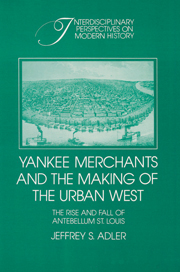Book contents
3 - Savagedom, destiny, and the isothermal zodiac
Published online by Cambridge University Press: 14 September 2009
Summary
For western cities, growth began in the East. Migrants and capital from the eastern states generated urban development in the antebellum West and transformed frontier towns into major commercial centers. The great urban rivalries of the nineteenth century, therefore, were often decided hundreds of miles from the cities that were involved. Moreover, frontier boosters recognized this fact and waged their literary wars in New York, Boston, Philadelphia, and other large population centers. Victory did not depend on the quantity of the promotional literature that energetic editors manufactured. Instead, eastern perceptions of western cities – and the responses that those perceptions triggered – determined the winner. St. Louis crushed Quincy, for example, because easterners knew more about St. Louis and because they responded favorably to what they had read and heard about St. Louis. The city that attracted migrants and investors denied such resources to its rivals. As a result, St. Louis triumphed.
But because victory began in the East rather than in the West, success reflected what easterners read – not what westerners wrote. Thus, the body of information available to easterners shaped the course of urban development. Potential settlers and investors, however, knew far more about western cities than what local boosters manufactured.
- Type
- Chapter
- Information
- Yankee Merchants and the Making of the Urban WestThe Rise and Fall of Antebellum St Louis, pp. 43 - 60Publisher: Cambridge University PressPrint publication year: 1991



